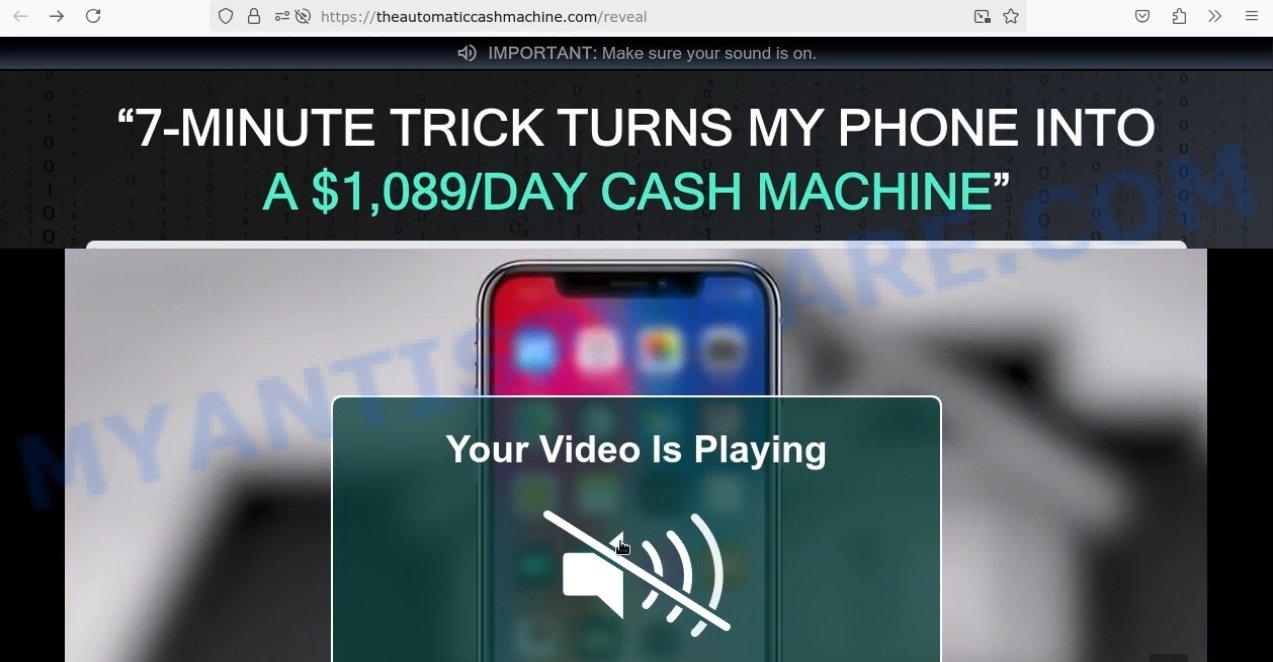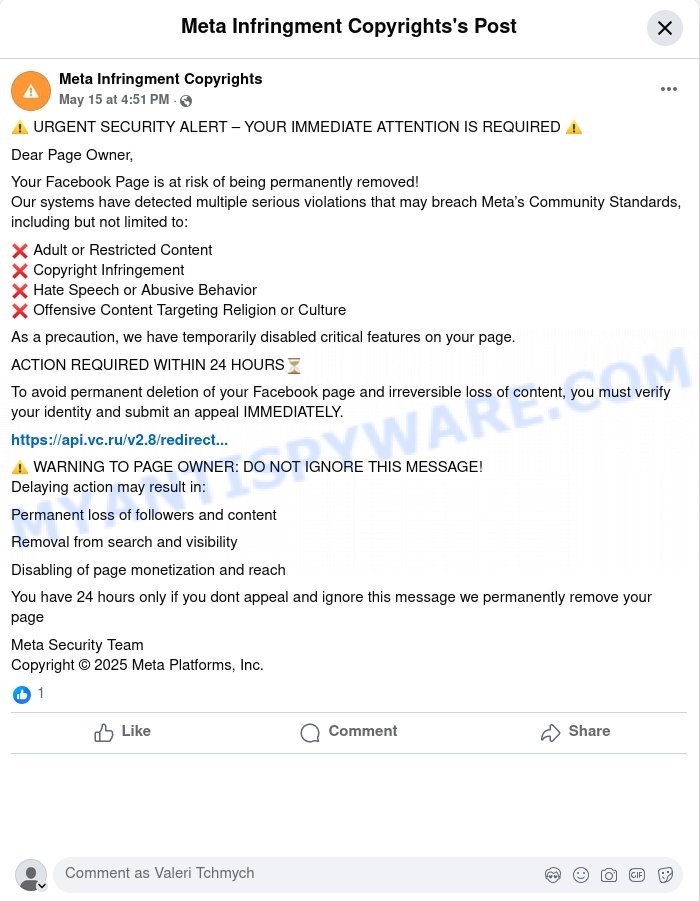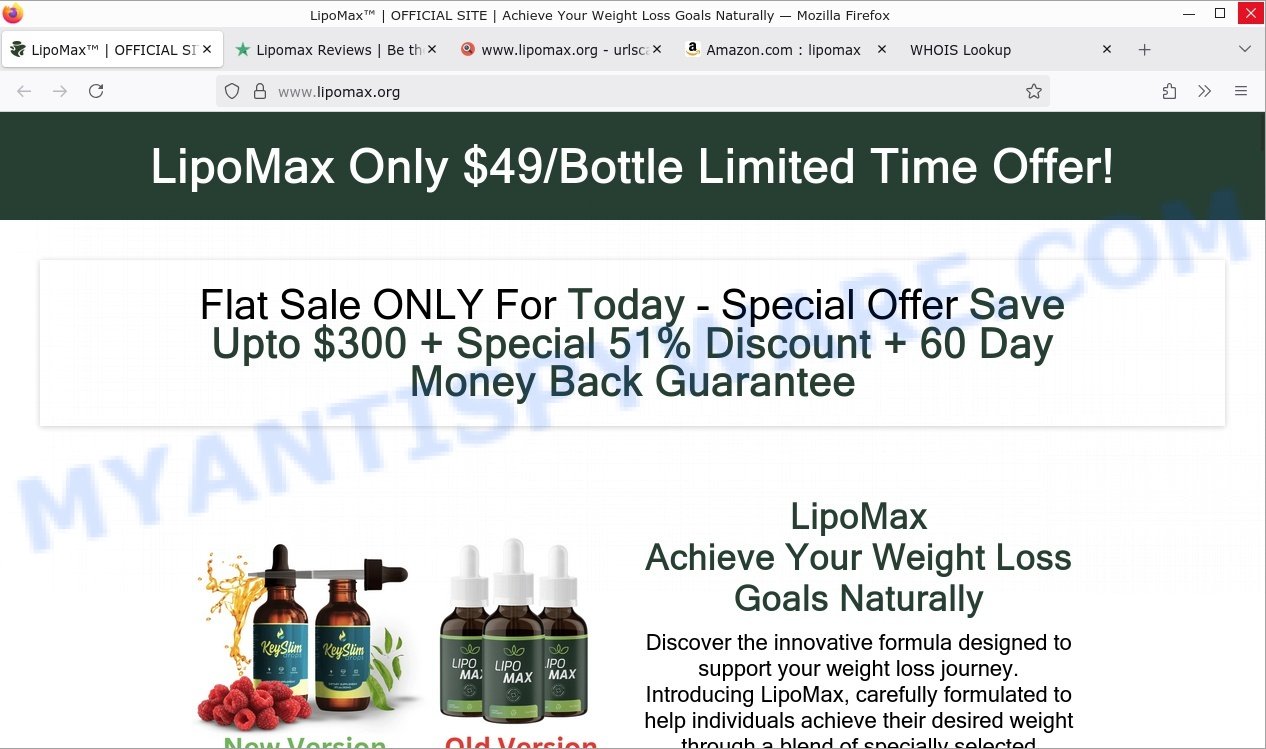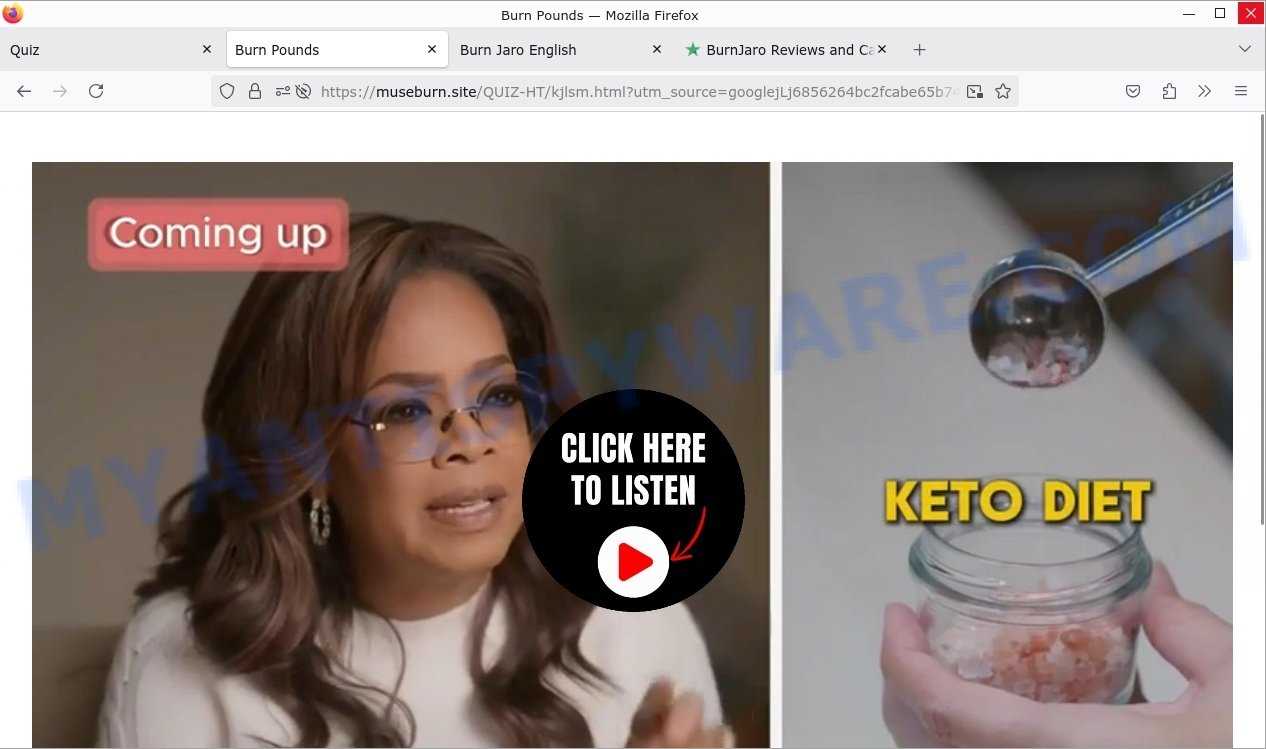Beware of the Prozenith Scam – Don’t Fall for the “Pink Salt Trick” Hype! Scammers are flooding Facebook ads with flashy promos for Prozenith, a so-called weight loss “solution” linked to an exotic “pink salt trick” that supposedly melts stubborn fat fast. These ads push a long, misleading video filled with emotional storytelling, fake endorsements, and shady promises about effortless weight loss, celebrity secrets, and miraculous results.
At first glance, you’re tempted by claims of dropping up to 14 pounds in just 10 days without Ozempic, backed by fake badges like “FDA Registered”, “GMP Certified”, and “100% Natural”. The site even displays logos of major news outlets like The New York Times and CNN—but none of these are real endorsements, and there are no credible studies or proof to support any of their wild claims.
The so-called video is a trap: the progress bar moves fast initially, enticing you to watch longer, but the actual “pink salt trick” is never fully revealed. Instead, they push you to buy Prozenith supplements at inflated prices, with offers that pressure you into buying multiple bottles bundled with free shipping. The checkout process asks for your personal and payment information behind a seemingly secure page—yet many buyers report unauthorized charges and an inability to get refunds.
Real customers share troubling reviews describing double charges, aggressive upselling, and terrible customer service. Many call Prozenith a complete scam, warning others that the product’s ingredients don’t match the claims and that the company disappears once they’ve got your money. Refund requests often go ignored.
If you’re thinking about trying Prozenith or any “pink salt” weight loss trick, think twice. These promises are too good to be true and mask a sophisticated scam designed to take your money and leave you frustrated. Always consult with a medical professional before starting any supplement, and research thoroughly to avoid falling victim to deceptive marketing and fake products. Remember, there are no shortcuts to genuine health and weight loss, only careful, science-backed steps—and definitely not shady hacks promoted through endless online hype. Stay safe and informed!
💡 Heads-up: Similar Scams Are Everywhere. Prozenith is not unique. It is one of many fake supplements, gadgets, and other schemes we expose in our Fact Checks section. All of them aim to grab your personal data or money. The people behind these scams run slick websites, spread bogus promo codes, and even pose as trusted brands or experts. Below are a few recent scams that follow the same playbook as Prozenith: Automatic Cash Machine, Japanese Pink Salt Recipe, Dr. Emma Clark Pumpkin Seed Recipe, PEAKA GLP-1, AlphaCur Nerve Health Support.
Table of Contents
🚨 Is Prozenith a Scam?
Prozenith is aggressively marketed through misleading Facebook ads and deceptive promotional videos that promise effortless weight loss by using a mysterious “Pink Salt Trick“. This marketing strategy preys on people desperate for quick fixes, but the claims lack credible evidence and transparency, raising serious concerns about the product’s legitimacy.
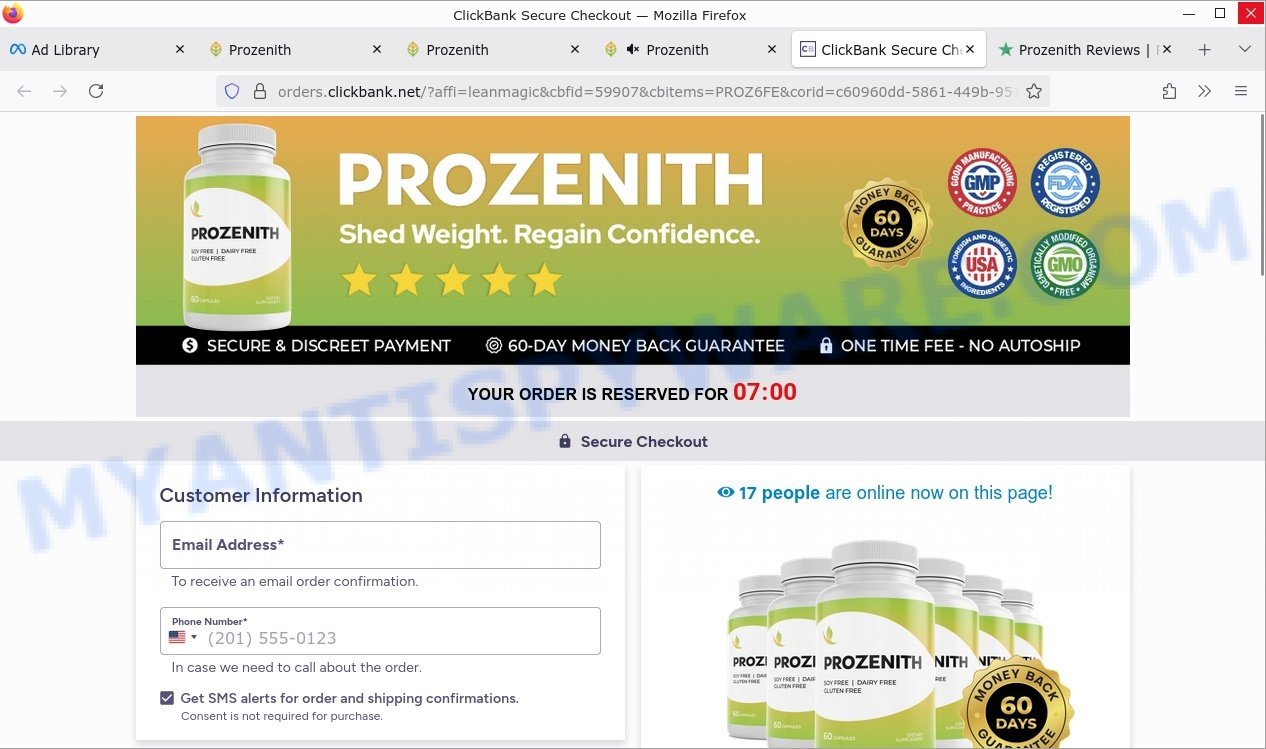
Key Red Flags:
- 🌐 Misleading Facebook Ads and Redirects: Ads lead to celebslimsecrets.com where a fake video claiming to reveal a secret fat-dissolving method instead funnels viewers into purchasing Prozenith. The video’s progress bar manipulates viewers by initially moving fast to build anticipation, then slowing considerably without revealing any real “pink salt trick”.
- ⭐ Fabricated Testimonials and Fake Endorsements: The product’s website and promotional material feature ultra-positive 5-star reviews and fake badges, including misleading claims about FDA registration, GMP certification, and endorsements from major news outlets without providing verifiable proof.
- 🔒 Lack of Transparent Product Information: Despite clever marketing, the actual ingredients listed do not match the touted “pink salt” and other weight loss components discussed in the presentation. The website provides no solid evidence or clinical studies to back its claims.
- ⚠️ Unsubstantiated Health and Weight Loss Claims: Promises of losing up to 14 pounds in 10 days with just four ingredients are exaggerated and unsupported by scientific research. Such claims are classic signs of a scam supplement.
- 📉 Poor Customer Service and Scam Reports: Verified consumer reviews on Trustpilot and other platforms show serious complaints including duplicate charges, aggressive upselling, refusal of refunds, and unresponsive or hostile customer service representatives.
- 👤 Pushy Sales Tactics and Time-Limited Discounts: The sales page pressures customers with countdown timers, limited stock warnings, and steep discounts to encourage impulse buying without allowing time for informed decisions.
- 🔗 Personal and Payment Information Requested Prematurely: The checkout process requests sensitive personal and payment details on a website riddled with red flags, heightening the risk of financial loss or fraud.
In summary, all signs point to Prozenith being a deceptive supplement scam. Its marketing relies on fake videos, unverified endorsements, misleading health claims, and aggressive sales tactics. Real customer experiences reveal significant issues with billing and refunds, confirming the lack of genuine consumer support. We strongly advise avoiding Prozenith and instead seeking professional medical advice and scientifically supported weight loss methods. Stay vigilant and protect yourself from falling victim to such scams.
🕵️♂️ How the Prozenith Weight Loss Scam Operates
Scammers behind Prozenith begin by running targeted ads and sponsored posts on popular social media platforms like Facebook. These ads heavily promote a mysterious “Pink Salt Trick” or “celebrity hack” that supposedly dissolves stubborn fat quickly and effortlessly. To grab attention, they use sensational phrases such as “94.6% still haven’t tried this secret” or “Lose 14 pounds in just 10 days without Ozempic”, often accompanied by flashy images and fake celebrity endorsements.
Clicking on these ads takes users to unofficial and suspicious websites like celebslimsecrets.com, which imitate trustworthy health sites but primarily consist of long, drawn-out sales videos with minimal genuine information. The embedded videos pretend to reveal a breakthrough weight loss secret but drag on with irrelevant stories and testimonials, deliberately delaying any real explanation or proof about the product or the “pink salt trick”. Eventually, the video pushes viewers to buy Prozenith, claiming it contains the four magical ingredients needed for weight loss.
The websites use false badges and endorsements, boasting about FDA registration, GMP certification, and being made in the USA with “100% natural ingredients”—all without providing verifiable proof or legitimate third-party certifications. They even display logos of reputable news organizations like The New York Times, ABC, FOX, and CNN, but these are mere graphics without any actual affiliation.
To create urgency, the scam sites often show real-time stock countdowns (“only 113 bottles left”), time-limited offers, and heavy discounts on multi-bottle packages. They promise “free shipping” and “60-day money-back guarantees”, pressuring customers to make hasty purchases. However, the refund process is typically opaque. Many buyers report difficulties obtaining refunds, being subjected to unauthorized additional charges, or being pushed into expensive upsells and memberships disguised as savings.
The product reviews presented on Prozenith’s sales pages are overwhelmingly positive and laden with 5-star ratings, but independent platforms like Trustpilot reveal a contrasting story. Actual customers report frustrating experiences: double-charges, misleading sales tactics, aggressive upselling of costly supplements, unhelpful or incommunicative customer support, and eventual financial loss. Common complaints include unclear billing practices, refusal to cancel orders, and an inability to reach supervisors.
In summary, the Prozenith scam relies on deceptive social media marketing, long and manipulative sales videos, fake endorsements and badges, misleading urgency tactics, and fabricated customer testimonials. While promising effortless weight loss breakthroughs, the product itself is backed by no credible scientific evidence, and consumers are often left disappointed, financially harmed, and frustrated with poor customer service. Approach Prozenith with extreme caution and always research thoroughly before making any purchase.
😱 What to Do If Scammed
If you find yourself ensnared by the Prozenith Scam, immediate action is crucial. Here’s what you should consider doing:
🛑 Stop Further Transactions
The first step is to halt any additional transactions that might be in process. Contact your bank or credit card provider and inform them that you’ve fallen victim to a scam. They can help by blocking the card or reversing any unauthorized transactions.
📞 Report the Fraud
File a report with your local police and provide all the available evidence, such as screenshots, emails, and website URLs. Additionally, report the scam to online portals like the Better Business Bureau (BBB) at www.bbb.org or the Federal Trade Commission (FTC) at reportfraud.ftc.gov. If you’re in another country, reach out to your national consumer protection agency.
💻 Take Screenshots
Before the scam website gets taken down or changes, make sure to capture screenshots of your transactions and communications. These can serve as evidence if you decide to pursue legal action.
⚖️ Consult Legal Advice
Speak to a legal advisor about your situation. While pursuing legal action may be time-consuming and costly, it could be a possible avenue for recovering your lost money.
📢 Share Your Experience
Use social media platforms to share your experience and warn others about the scam. Your story could prevent someone else from falling victim to the same or similar scams.
Summary Table
| Factor | Observations | Impact on Legitimacy |
|---|---|---|
| Advertising | Prozenith is promoted through Facebook ads featuring a sensational “Pink Salt Trick” video that promises easy weight loss. The ads use clickbait phrases and lead to a website where the “video” is just an image linking to another page. The long video contains a slow buildup without revealing the promised trick, ending by pushing the Prozenith product for sale. | Negative (Misleading ads and deceptive video content) |
| Product Claims | The website claims Prozenith can help lose up to 14 pounds in 10 days using natural ingredients. It also claims FDA registration, GMP standards, and includes fake news logos to imply credibility. However, no real proof or certificates are provided to support these claims. | Negative (False claims and lack of evidence) |
| Website Design | The sales page uses high-pressure tactics with countdown timers, limited stock warnings, fake positive badges, and offers heavy discounts to push users to buy quickly. Personal and payment details are collected on a standard checkout page with promises of security. | Negative (Pressure selling and potentially unsafe sales tactics) |
| Ingredients | The product label lists turmeric and piperine as ingredients, which differ from the “Pink Salt Trick” mentioned in the video. This mismatch suggests the product does not deliver what is advertised. | Negative (Ingredient mismatch and unclear product content) |
| Customer Reviews | On the official site and promos, only 5-star reviews are shown, likely fake. Independent reviews on Trustpilot show a low rating (2.2) with many complaints about double charges, poor customer service, and misleading sales practices. | Negative (Fake positive reviews and real customer complaints) |
| Customer Service | Reviews describe rude or unhelpful support, difficulties in cancelling orders, and problems getting refunds. Customers report being pressured into buying more expensive packages and no clear help after payment. | Negative (Poor customer support and refund issues) |
| Refund Policy | A 60-day money-back guarantee is stated, but user experiences indicate refunds are hard to get or ignored, casting doubt on the policy’s reliability. | Negative (Unreliable refund process) |
| Overall Legitimacy | The product and its promotion strongly resemble a scam with false advertising, fake endorsements, misleading videos, poor customer feedback, and questionable business practices. | Negative (Likely scam with untrustworthy claims and poor service) |
Conclusion
The Prozenith supplement is a scam that aggressively promotes a mysterious “Pink Salt Trick” for rapid weight loss but never actually reveals the secret in its lengthy, manipulative video presentations. Instead, visitors are pressured into buying expensive Prozenith packages with false promises of effortless weight loss and improved health. The marketing relies heavily on fake badges such as “FDA REGISTERED”, “GMP CERTIFIED”, and “100% NATURAL INGREDIENTS” without providing any verifiable evidence or certification documents.
The product page features misleading endorsements from major news outlets like The New York Times, ABC, and CNN, but these logos are used without authorization and have no links to authentic coverage. Customers are lured with enticing discounts and guarantees but report multiple issues such as unauthorized charges, aggressive upselling of costly additional supplements, and extremely poor customer service that refuses refunds or cancellations.
Bottom Line: Avoid Prozenith at all costs. It uses deceptive advertising tactics, fake reviews, and unsubstantiated claims to scam consumers out of their money. Real user feedback shows widespread dissatisfaction and problems accessing refunds. If a weight loss product depends heavily on hype, lengthy sales funnels, and secret formulas that are never disclosed, it’s likely fraudulent. Always research carefully before purchasing and do not trust unfounded endorsements or exaggerated discounts that pressure you into rushed decisions. Stay safe and skeptical.
